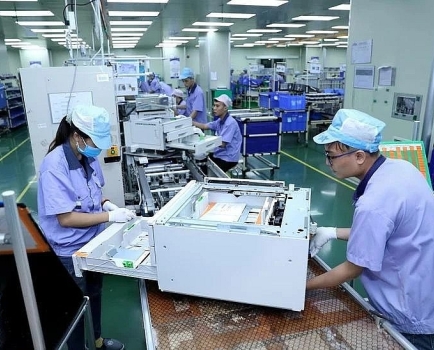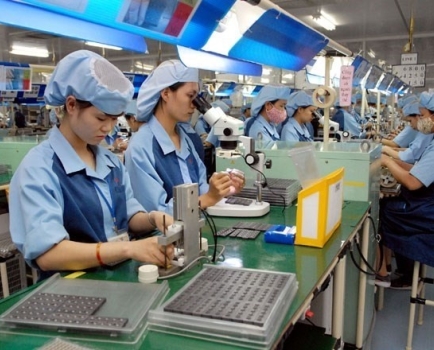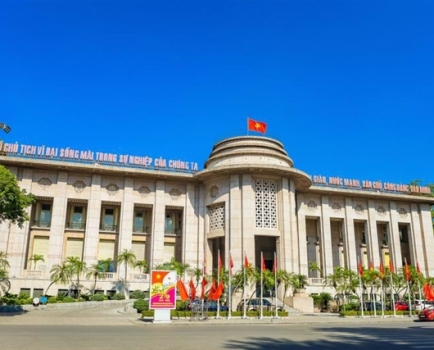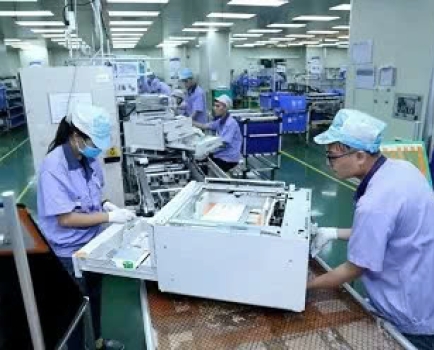Organic textiles produced in Vietnam
Mon, 23 Dec 2024 13:32:00 | Print | Email Share:
Apart from procuring machinery and equipment for the production of organic textile products, Vietnamese enterprises are gradually taking the initiative in sourcing raw materials that meet the organic standard - a very high standard in the global textile industry.
 |
| Highly durable fiber is produced from hemp with advanced, modern technology |
In 2024, the textile and garment industry is expected to earn an export revenue of US$44 billion, 10 percent more than 2023. Vu Duc Giang, Chairman of the Vietnam Textile and Apparel Association (VITAS), said that businesses in the industry are currently negotiating orders for 2025, with some companies already securing orders for production through the first quarter of 2025.
Sharing the “secret” behind the textile and garment industry’s double-digit growth just one year after experiencing negative growth in 2023, Giang identified three key factors - market diversification, customer diversification, and product diversification.
He said Vietnam is producing a wide range of items, from the smallest products to those with high complexity and added value, with organic products being a prime example.
According to Vu Duc Tho, CEO of Dong Xuan Knitting Co., Ltd., organic textiles require raw materials that meet the Global Organic Textile Standard (GOTS). This ensures that organic cotton is cultivated without harmful chemicals, such as synthetic pesticides and fertilizers, and is produced using natural and sustainable methods. These standards aim to maintain environmental balance while protecting the health of farmers and consumers.
“At Hung Yen Garment Factory, we operate two production lines dedicated to organic textile products for Japanese customers. The factory has also invested in 94 specialized machines exclusively for organic knitwear production.”
Tho said that since the factory began making organic products, its productivity has increased by approximately 30 percent, and the unit price of organic products is significantly higher than that of conventional ones. Notably, after negotiations, the customer agreed to allow Dong Xuan to independently seek standard domestic material suppliers. This helps the company secure a steady supply of raw materials, reduce costs and add value to its products.
It is a great joy for Dong Xuan Knitting Co., Ltd. to have its domestic raw material suppliers approved by partners as meeting the necessary standards for producing organic goods, as the production of organic yarn and fabric in Vietnam is growing rapidly, although it is still on a small scale. There is fabric produced from hemp fibers by An Phuoc Group. An Phuoc Hemp Fiber Factory has a capacity of approximately 10,000 fiber spools per year, equivalent to 1,700 tonnes of hemp fiber per year and 1,400 tonnes of hemp cotton per annum. With advanced machinery, equipment and production lines imported from Italy, Germany and China, the company can produce 100% hemp yarns, varying in specifications, as well as mixed hemp yarn products.
 |
| Ananas eco-fiber, made from pineapple leaves, was introduced in September 2024 |
In September 2024, Ananas eco-fiber, made from pineapple leaves, was introduced. This is the result of a strategic collaboration between Ecofa Vietnam and Bao Lan Textile. It is expected that in the near future, pineapple fiber will be mass-produced and supplied in large quantities to the market annually. According to Engineer Dau Van Nam, the founder of Ecofa, pineapple fiber can be custom-blended with other eco-fibers such as organic cotton, Bamboo Biocell, silk, wool, etc., to create a variety of popular materials, such as denim, elastic fabric, terry cloth towels, woven fabrics, and knitted fabrics, among others.
It can be seen that Vietnamese textile enterprises have been very quick to adapt to the global green trends in the textile industry. In addition to production, the development of natural fiber sources also demonstrates the creativity and flexibility of businesses. The strong and pioneering development of hemp fiber, pineapple fiber, as well as coffee grounds fiber and recycled fibers from plastic bottles, will provide a solid foundation for the Vietnamese textile industry to accelerate and take control of the green textile product supply chain, including organic products.
VITAS Chairman Vu Duc Giang said textile enterprises need to take the initiative in investing in technology and innovative research, and they also need support in workforce training. Green finance is important for businesses. He suggested that the Government direct the State Bank of Vietnam to create a green fund or green financial sources that allow businesses shifting to green technology to access preferential loans. There should be large-scale textile industrial zones with modern wastewater treatment facilities that meet the necessary standards to attract raw material producers, helping the industry to take control of the upstream supply chain./.
By: Viet Nga/ Vietnam Economic News
Source: https://ven.congthuong.vn/organic-textiles-produced-in-vietnam-55682.html
---------------------------------------------
Same category News :













